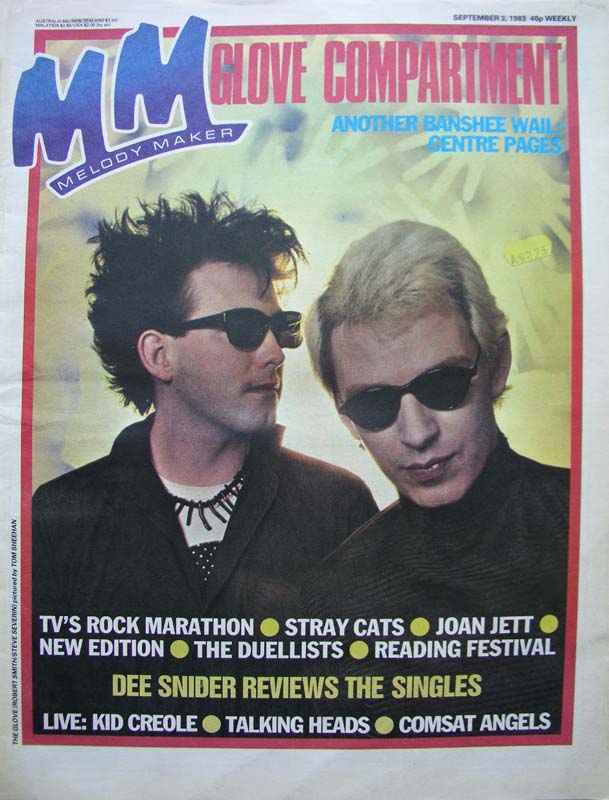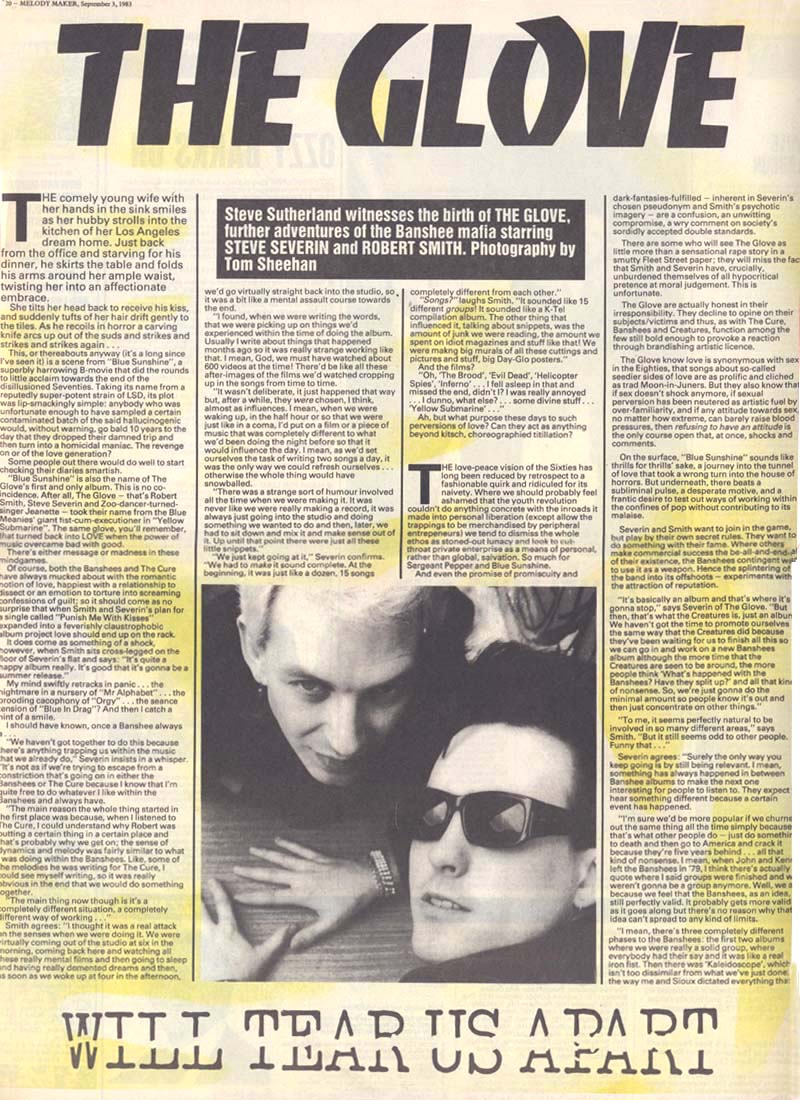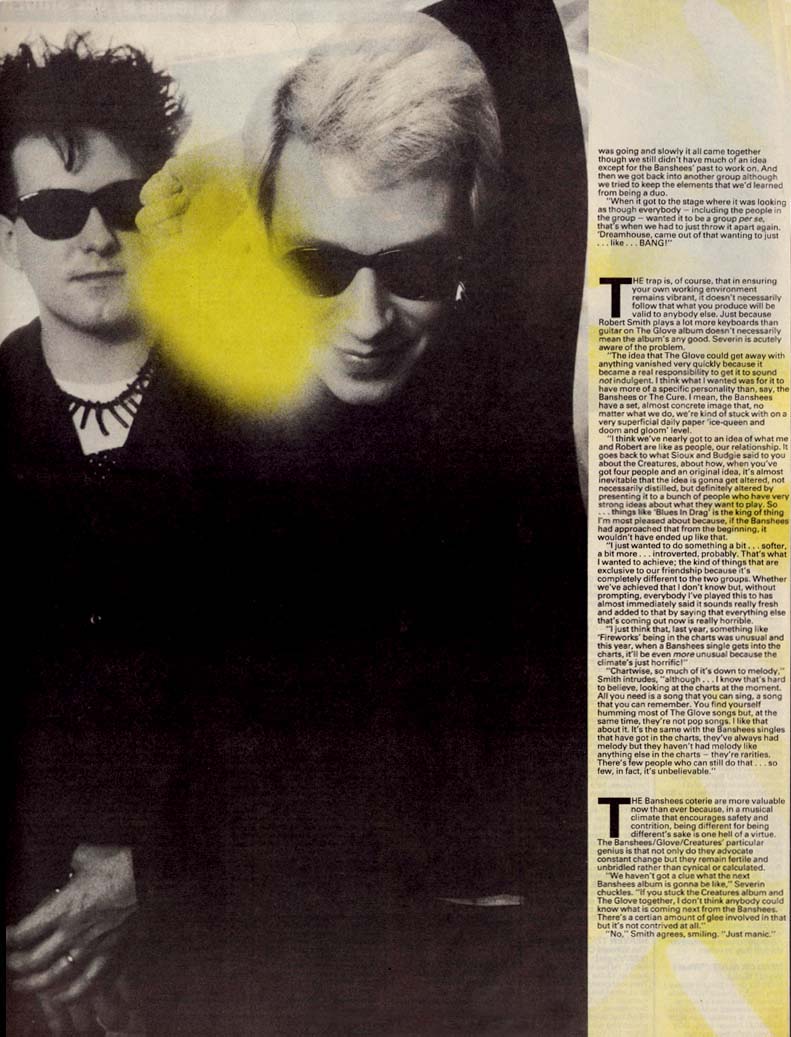"Glove Compartment"






|
THE GLOVE WILL TEAR US APART
Steve Sutherland witnesses the birth of The Glove, further adventures of the Banshee mafia starring STEVE SEVERIN and ROBERT SMITH.
The comely young wife with her hands in the sink smiles as her husband strolls into the kitchen of her Los Angeles dream home. Just back from the office and starving for his dinner, he skirts the table and folds his arms around her ample waist, twisting her into an affectionate embrace.
She tilts her head back to receive his kiss, and suddenly tufts of her hair drift gently to the tiles. As he recoils in horror a carving knife arcs up out of the suds and strikes and strikes and strikes again....
This, or thereabouts anyway (it's a long time since I've seen it) is a scene from 'Blue Sunshine', a superbly B-movie that did the rounds to little acclaim towards the end of the disillusioned seventies. Taking it's name from a reputedly super-potent strain of LSD, it's plot was lip-smackingly simple: anybody who was unfortunate to have sampled a certain contaminated batch of the said hallucinogenic would, without warning, go bald ten years to the day that they dropped their dammed trip an then turn into a homicidal maniac. The revenge on or of the love generation?
Some people out there would do well to start checking their diaries smartish.
'Blue Sunshine' is also the name of The Glove's first and only album. This is no coincidence. After all, The Glove - that's Robert Smith, Steve Severin and Zoo-dancer-turned-singer Jeanette - took their name from the Blue Meanies' giant fist-cum-executioner in 'Yellow Submarine'. The same glove, you'll remember that turned back into LOVE when the power of music overcame bad with good.
There's either message or madness in these mindgames.
Of course, both the Banshees and The Cure have always mucked about with the romantic notion of love, happiest with a relationship to dissect or an emotion to torture into screaming confessions of guilt; so it should come as no surprise that when Smith and Severin's plan for a single called 'Punish Me With Kisses' expanded into a feverishly claustrophobic album project love should end up on the rack.
It does come as something of a shock however when Smith sits crossed-legged on the floor of Severin's flat and says "It's quite a happy album really. It's good that it's gonna be a summer release."
My mind swiftly retracts in panic... the nightmare in a nursery of 'Mr. Alphabet'...the brooding cacophony of 'Orgy'... the séance tension of 'A Blues In Drag'? And then I catch a hint of a smile.
I should have known, once a Banshee always a...
"We haven't got together to do this because there's anything trapping us within the music that we already do". Severin insists in a whisper, "it's not as if we're trying to escape from a constriction that's going on in either the Banshees or The Cure because I know that I'm quite free to do whatever I like within the Banshees and always have.
"The main reason the whole thing started in the first place was because when I listened to The Cure, I could understand why Robert was putting a certain thing in a certain place and that's probably why we get on; the sense of dynamics and melody was fairly similar to what I was doing within the Banshees. Like, some of the melodies he was writing for The Cure, I could see myself writing, so it was really obvious in the end that we would do something together.
"The main thing now though is it's a completely different situation, a completely different way of working..."
Smith agrees: "I thought it was a real attack on the senses when we were doing it. We were virtually coming out of the studio at six in the morning, coming back here and watching all these really mental films and then going to sleep and having really demented dreams and then, as soon as we woke up at four in the afternoon, we'd go virtually straight back into the studio, so, it was a bit like a mental assault course towards the end.
"I found, when we were writing the words, that we were picking up on things we'd experienced within the time of doing the album. Usually I write about things that happened months ago, so it was really strange working like that, I mean' God, we must have watched about 600 videos at the time! There'd be all these after-mages of the film we'd just watched cropping up in the songs from time to time.
"It wasn't deliberate, it just happened that way but, after a while, they were chosen, I think almost as influences. I mean, when we were waking up, in the half hour or so that we were just like in a coma, I'd put on a film or a piece of music that was completely different to what we'd been doing the night before so that it would influence the day. I mean, as we'd set ourselves the task of writing two songs a day, it was the only way we could refresh ourselves.... otherwise the whole thing would have snowballed.
"There was a strange sort of humour involved all the time we were making it. It was never like we were really making a record, it was always just going into the studio and doing something we wanted to do and then, later, we had to sit down and mix it and make sense out of it. Up until that point there were just all these little snippets."
"We just kept going at it," Severin confirms. "We had to make it sound complete. At the beginning it was just like a dozen, 15 songs completely different from each other."
"Songs?" laughs Smith, "It sounded like 15 different groups! It sounded like a K-Tel compilation album. The other thing that influenced it, talking about snippets, was the amount of junk we were reading, the amount we spent on idiot magazines and stuff like that! We were making big murals of these cuttings and pictures and stuff, big Day-Glo posters."
And the films?
"Oh, 'The Brood', 'Evil Dead', 'Helicopter Spies', 'Inferno'...I fell asleep in that and missed the end, didn't I? I was really annoyed... I dunno, what else?... some divine stuff... 'Yellow Submarine'..."
Ah, but what purpose these days to such perversions of love? can they act as anything beyond kitsch, choreographed titillation?
The love-peace vision of the Sixties has long been reduced by retrospect to a fashionable quirk and ridiculed for its naivety. Where we should probably feel ashamed that the youth revolution couldn't do anything concrete with the inroads it made into personal liberation (except allow the trappings to be merchandised by peripheral entrepreneurs) we tend to dismiss the whole ethos as stoned-out lunacy and look to cut-throat private enterprise as a means of personal, rather than global, salvation. So much for Sergeant Pepper and Blue Sunshine.
And even the promise of promiscuity and dark-fantasies fulfilled - inherent in Severin's chosen pseudonym and Smith's psychotic imagery - are a confusion, and unwitting compromise, a wry comment on society's accepted double standards.
There are some who will see The Glove as little more than a sensational rape story in a smutty Fleet Street paper; they will miss the fact that Smith and Severin have, crucially unburdened themselves of all hypocritical pretence at moral judgement. This is unfortunate.
The Glove are actually honest in their irresponsibility. They decline to opine on their subjects/victims and thus, as with The Cure, Banshees and Creatures, function among the few still bold enough to provoke a reaction through brandishing artistic license.
The Glove know love is synonymous with love in the Eighties, that songs about so-called seedier sides of love are as prolific and clichéd as trad Moon-in-Juners. But they also know that if sex doesn't shock anymore, if sexual perversion as been neutered as artistic fuel by over-familiarity, and if any attitude towards sex, no matter how extreme, can barely raise blood pressures, then refusing to have an attitude is the only course open that, at once, shocks and comments.
On the surface 'Blue Sunshine' sounds like thrills for thrills' sake, a journey into the tunnel of love that took a wrong turn into the house of horrors. But underneath, there beats a subliminal pulse, a desperate motive, and a frantic desire to test out ways of working within the confines of pop with contributing to its malaise.
Severin and Smith want to join in the game, but play by their own secret rules. They want to do something with their fame. Where others make commercial success the be-all-and-end-all of their existence, the Banshees contingent was to use it as a weapon. Hence the splintering of the group into offshoots. Experiments with the attraction of repulsion.
"It's basically an album and that's where it's gonna stop," says Severin of The Glove. "But then, that's what The Creatures is, just an album. We haven't got the time to promote ourselves the same way The Creatures did because they've been waiting for us to finish all this so we can go in and work on a new Banshees album although the more time The Creatures are seen to be around, the more people think 'What's happened with the Banshees, have the split up?' and all that kind of nonsense. So, we're just gonna do the minimal amount so people know it's out and then just concentrate on other things."
"To me it seems perfectly natural to be involved in so many different areas," says Smith, "But it still seems odd to other people. Funny that..."
Severin agrees: "Surely the only way you keep going is by still being relevant, I mean, something has always happened in between Banshee albums to make the next one interesting for people to listen to. They expect to hear something different because a certain event has happened.
"I'm sure we'd be more popular if we churned out the same thing all the time simply because that's what other people do - just do something to death and then go to America and crack it because they're five years behind... all that kind of nonsense. I mean, when John and Kenny left the Banshees in 79, I think there's actually a quote where I said groups were finished and we weren't gonna be a group anymore. Well we are because we feel the Banshees, as an idea are still perfectly valid. It probably gets more valid as it goes along but there's no reason why that idea can't spread to any kind of limits.
"I mean, there's three completely different phases to the Banshees; the first two albums where we were really a solid group, where everybody had their say and it was like a real iron fist. Then there was 'Kaleidoscope', which isn't too dissimilar from what we've just done, the way me and Sioux dictated everything that was going and slowly it all came together though we still didn't have much of an idea except for the Banshees past to work on. And then we got back into another group, although we tried to keep the elements we'd learned from being a duo.
"When it got to the stage where it was looking as though everybody - including the people in the group - wanted it to be a group per se, that's when we had to throw it apart again. 'Dreamhouse' came out of that wanting to just like... BANG!"
The trap is, of course, that in ensuring your own working environment remains vibrant, it doesn't necessarily follow that what you produce will be valid to anybody else. Just because Robert Smith plays a lot more keyboards than guitar on The Glove album doesn't necessarily mean the album's any good. Severin is acutely aware of the problem.
"The idea that The Glove could get away with anything vanished very quickly because it became a real responsibility to get it to sound not indulgent. I think what I wanted was for it to have more of a specific personality than, say, the Banshees or The Cure. I mean, the Banshees have a set, almost concrete image that, no matter what we do, we're kind of stuck with on a very superficial daily paper 'ice-queen and doom and gloom' level.
"I think we've nearly got to an idea of what me and Robert are like as people, our relationship. It goes back to what Sioux and Budgie said about The Creatures, about how, when you've got four people and an original idea, it's almost inevitable that the idea is gonna get altered, not necessarily distilled, but definitely altered by presenting it to a bunch of people who have very strong ideas about what they want to play. So.... things like 'Blues In Drag' is the kind of thing I'm most pleased about because, if the Banshees had approached that from the beginning, it wouldn't have ended up like that.
"I just wanted to do something a bit... softer, a bit more... introverted, probably. That's what I wanted to achieve: the kind of things that are exclusive to our friendship because it's completely different to the two groups. Whether we've achieved that I don't know but, without prompting, everybody I've played this to has almost immediately said it sounds really fresh and added to that by saying that everything else that's coming now is really horrible.
"I just think that, last year, something like 'Fireworks' being in the charts was unusual and this year, when a Banshees single gets in the charts it'll be even more unusual because the climate's just horrific!"
"Chartwise, so much of it is down to melody," Smith intrudes, "although... I know that's hard to believe, looking at the charts at the moment. All you need is a song that you can sing, a song that you can remember. You find yourself humming most of The Glove songs but, at the same time, they're not pop songs. I like that about it. It's the same with the Banshees singles that have got in the charts, they've always had melody, but they haven't had melody like anything else in the charts - they're rarities. There's few people who can still do that... so few in fact, it's unbelievable."
The Banshees coterie are more valuable now than ever because, in a musical climate that encourages safety and contrition, being different for being deferent's sake is one hell of a virtue. The Banshees/Glove/Creatures' particular genius is that not only do they advocate constant change but they remain fertile and unbridled rather than cynical or calculated.
"We haven't a clue what the next Banshees album is gonna be like," Severin chuckles, "if you stuck The Creatures album and The Glove's together, I don't think anybody could know what is coming next from the Banshees. There's a certain amount of glee involved in that but it's not contrived at all."
"No," Smith agrees, smiling. "Just manic." |